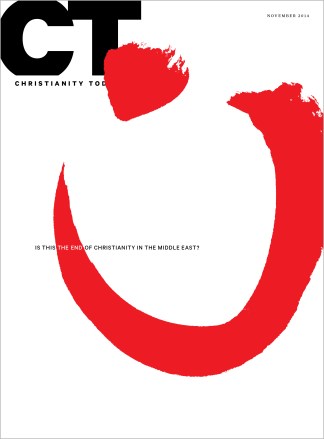Philip Jenkins has been preparing to write this issue’s cover story (p. 36) for a long time. Starting in 2002 with The Next Christendom: The Coming of Global Christianity, Jenkins, distinguished professor of history at Baylor University, has published books on global Christianity, lost Christianity, and wars fought in the name of Jesus—each one shedding fresh light on our faith history.
But nothing could have fully prepared him to write about what has happened in 2014. The rise of the Islamic State (ISIS or ISIL) has all but extinguished the Christian presence in Syria and northern Iraq, where believers have lived since the first century. Jenkins is skilled at exposing readers to the big picture, explaining the history underneath news headlines, and offering a glimpse into the future. During years of study on ancient churches of the Middle East, he’s had many of what he calls “light-bulb moments.”
“My favorite was discovering the Church of the East and its 15th- to 16th-century list of its early leaders and prelates,” he told me. These leaders, he believes, were preserving the memory of the church founded in Antioch, which later moved to Edessa (modern Turkey). The Church of the East was then led by two men who owed their authority to their descent from Joseph, the husband of Mary. “What we see in the modern world, with the Assyrians, Chaldeans, and the rest, is a direct descendant.”
Another light bulb went off for Jenkins in August 2004, when the Zarqawi network car-bombed several active churches in Baghdad and Mosul. “I was dumb enough to ask, Don’t they realize what they are doing here? But of course they knew very well. That sickening event certainly shaped my approach.”
To complement Jenkins’s essay, editors have compiled a timeline of 14 centuries of Christian–Muslim encounters. According to Islamic tradition, in the 7th century, Muhammad turned to a Christian relative for insight into his first vision. Jenkins invites us to try to locate today’s events on a divine timeline. This echoes CT’s editorial view on the Middle East nearly 60 years ago, in November 1957:
It is difficult to interpret God’s mysterious hand in history, and even more difficult for us to understand the relation of immediate events to his ultimate plan. At the same time, we should always confess that the sovereign God watches over people and nations and that all are subject to his judgment.
The body of Christ in the Middle East will survive the current conflict. And, if the global church embraces the Ephesians 4 call to unity and maturity in Christ, it may very well thrive.
Timothy C. Morgan is senior editor for global journalism.









